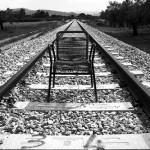But of course sin doesn’t take a holiday just because it’s in Africa. And a perfect Church has never existed and never will exist in this broken world. Instead of pure Christianity, Jonathan found a Church bound by legalism, prosperity Gospel, and spiritual control. Authoritarian behaviors controlled every aspect of his life in a cult-like fashion. Jonathan was deeply disturbed when he found there to be:
…the preaching of ‘a gospel that is used as a mechanism to control others, that puts words in God’s mouth, that teaches that Jesus came to make us all rich, that we’re to claim all the material possessions we want.’ He told [the missions leader] that he had witnessed spiritual leaders proclaiming false prophecies over people and shoving them to the ground to cast demons out of them. Any attempt to resist was met with belittling or accusations of lying. The leader was always right, always in control (94).
Jonathan was virtually imprisoned in an African church leader’s home, his outside contact closely monitored. He was unable to do, say, or write almost anything in privacy and without prior approval. The narrative was controlled by church leaders. If he spoke the truth about what was happening to him and about the many broken promises and mismanagement of the missions organization, likely donations would stop and power would be lost. The missions organization sought to control the narrative at all cost, even as Jonathan withered and died on the vine. Finally, a pastor back home was able to secure Jonathan’s return home. He returned a shell of a person, spiritually and emotionally wounded. Some of the leadership of the local congregation that had supported Jonathan, his home church, almost immediately went into damage control mode with him. They fiercely manipulated him spiritually and emotionally, in order to coerce him to not tell his story, to keep silent, telling him that it was for the good of the Body of Christ. He initially agreed, but not being allowed to tell the truth led to even more emotional turmoil. He veered off course into risky behaviors, feeling tremendously lost. When his mother hatched the idea to write a book together about the REAL story, Jonathan began the road to healing.
The glorious stories of missionary successes need to be heard. But so do the stories of the dark night of the soul, the stories about abuse that occurs on the mission field, the stories about the mission trips that don’t seem to reveal tangible results, the stories of the missionary couple whose marriage falls apart. Otherwise, we end up with unrealistic expectations and the belief that we can control our own narratives. But life happens, and hopefully we experience God in the midst of the messiness of REAL life, not the fake manufactured narrative that seeks to sell people something.
The power in Jonathan’s story is that it is real and true. Lying for the sake of Christ does everyone a disservice. It wounds the person who is forced to lie about their more difficult spiritual experiences. It communicates to fellow Christians that wounds and brokenness are not welcome here; only the spiritually perfect need apply, leading to a fake, surfacy, judgmental Christianity that falls far short of genuine, truthful relationship. Finally, it drives those who do not believe in God far, far away; who would want to be part of something that forces you to sublimate your real struggles and fails to show you compassion in the midst of your real questions?
The Hollingsworths have done us a great service with this book. They have shown us that real faith sometimes means dark nights of the soul. That real experience in the Christian Church–a flawed gathering of sinful people–includes times of spiritual abuse which should not be swept under the rug but rather confronted. It shows us that there is no such thing as a nascent, pure Christianity; we cannot escape sin, even if we surround ourselves with missionaries and other cultures. Sin is everywhere, in its various forms. But this book also reminds us that grace can meet us where we are in every culture. Grace is Christ coming and revealing the dead-end route of our efforts at spiritual perfection. It is His wild, lavish grace overwhelming us at the very moment when we hit rock bottom, freeing us to love our neighbor instead of compelling us to impress God by doing so. Jonathan Hollingsworth writes:
The human tendency to focus on works must have been frustrating to Jesus. Some of his harshest words were reserved for the law. Jesus never softened the law because the law cannot be tempered. It always accuses. When it comes to the law, nobody wins, and that is why Jesus’s debates with the Pharisees never lasted long. … It was almost as if he were saying, ‘If it’s law you want, then it’s law you’ll get (180).
Later, he writes:
There was a time when I, like the Pharisees, only saw what I wanted to see. I was looking for law, and law was all I found. But when I read the Gospels now, I can’t shake the feeling that Jesus didn’t come to show us what to do but rather to show us what he was going to do (182).
It’s Martin Luther’s famous, paradoxical saying in Freedom of a Christian:
A Christian man is the most free lord of all, and subject to none; a Christian man is the most dutiful servant of all, and subject to every one.
We are both things. But the order is important. The freedom comes first, not only at conversion, but each and every day. The freedom enables us to love.












